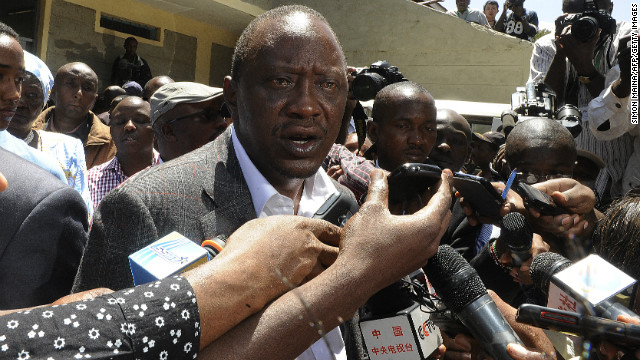March 30, 2013 -- Updated 1615 GMT (0015 HKT)
STORY HIGHLIGHTS
- NEW: Kenyatta's main rival, Prime Minister Raila Odinga, says he accepts the court decision
- NEW: UK Prime Minister David Cameron congratulates Kenyatta on his election win
- Court upholds the victory of Uhuru Kenyatta, son of Kenya's founding leader
- Presidential election was "free and fair," says Kenya's Supreme Court
Giving its ruling, the Supreme Court declared the election "free and fair."
Kenyatta, the 51-year-old son of Kenya's founding leader, won the ballot this month with 50.07% of the vote.
The court's decision means he will become the nation's fourth and youngest president.
His main rival, Prime
Minister Raila Odinga, who got 43.31% of the vote, had challenged the
outcome in court on the grounds that it was flawed and marred by
technical problems.
He said Saturday that he accepted the court's judgment and would abide by it.
Odinga said his challenge
was born of his dismay over the failures seen in the election, which
was dogged by technical problems. "Democracy was on trial in Kenya," he
said.
"That has not dented my
commitment to constitutionalism and the rule of law. Enforcing the
spirit and letter of the constitution remains the only sure way to peace
and prosperity for our young democracy.
"My decision to file a
petition in the Supreme Court to challenge the validity of the election
was a testament of my faith in the independence of our judiciary. I did
so for the sake of our democracy and for the sake of all Kenyans."
As the nation awaited the verdict, anti-riot police guarded the court in the capital of Nairobi while crowds hovered nearby.
Authorities stepped up security nationwide, and warned that gatherings are prohibited.
Last week, the nation's
highest court ordered a review of the results of 22 of the more than
33,000 polling stations after Odinga's lawyers said they had found
discrepancies.
The electoral commission has said that while the vote was marred by technical glitches, it was credible.
Kenyatta and Odinga are
the sons of the nation's first president and vice president,
respectively, bringing back memories of a political dynasty that dates
to the 1960s.
Their fathers started
out as allies in the quest for Kenyan independence from Britain. But the
elder politicians' relationship ended in bad blood when founding
President Jomo Kenyatta forced out his vice president, Jaramogi Odinga,
following a series of disputes.
Some five decades later, it is the sons' turn in the spotlight.
'Accept the ruling'
A peaceful response to
Saturday's judgment will go a long way toward restoring the nation's
image as a bastion of stability in the region after disputed election
results led to bloody chaos in 2007.
In that election, more
than 1,200 were killed and hundreds of thousands displaced after Odinga
disputed the results, which showed incumbent President Mwai Kibaki as
the winner.
At the time, supporters of both candidates battled on the streets with crude weapons, not in court.
"As the country awaits
the Supreme Court ruling, I call upon all of us to accept the ruling and
maintain peace," said Kibaki, the outgoing president, on Thursday.
"Kenyans should resume their routine economic activities as soon as possible to return normalcy in the country."
Beyond borders
The March 4 election was
the first general poll since the disputed election. It was conducted
under a reformed judicial system and a more inclusive electoral
commission.
The significance of Kenya's democratic process extends beyond the country's borders.
Kenya is East Africa's biggest economy and a crucial trade route into the rest of the continent.
It provides an important
buffer of stability in a region that includes the fledgling Somali
government and the politically tense Sudan and South Sudan.
Kenya is also a major
U.S. ally in the war against Islamist militants in the region and has
remained relatively peaceful amid civil wars in neighboring nations.
Complicated relations
The upholding of Kenyatta's victory raises the prospect of complicated diplomatic ties with the West.
The International
Criminal Court has indicted him for allegedly funding a local militia
that conducted reprisal attacks in the last election in 2007. His
running mate, William Ruto, also faces ICC charges at The Hague, in the
Netherlands.
Both have denied the charges and have said they will cooperate with the court to clear their names.
Analysts say the ICC indictment may have rallied citizens to Kenyatta's side in defiance of the West.
"Many Africans have lost
faith in ICC and view it as targeting African leaders and failing to
discharge its justice among non-African leaders," said Ayo Johnson,
director of ViewPoint Africa. "Kenya sent a loud message to the ICC ...
don't interfere. And it does not matter if you brand our leaders as
criminals."
Kenyatta has said the
indictment will not affect his ability to do his job and has urged the
international community to respect the will of Kenyans.
British Prime Minister
David Cameron has written to Kenyatta to congratulate him and all those
elected last month, a Downing Street spokesman said Saturday.
Cameron "urged the
Kenyan people to be proud of the strong signal they have sent to the
world about their determination to exercise their democratic right
peacefully," the spokesman said.
"He encouraged all Kenyans to continue this spirit of peace and accept the decision of the Court as final."
Cameron also welcomed
Kenyatta's promise that his government would "work with all Kenyans in a
spirit of inclusivity and reconciliation," while also meeting its
"international legal obligations."
CNN's Nima Elbagir reported from Nairobi.
Faith Karimi wrote and reported in Atlanta, while Laura Smith-Spark
wrote in London. Zarifmo Aslamshoyeva contributed to this report.

No comments:
Post a Comment